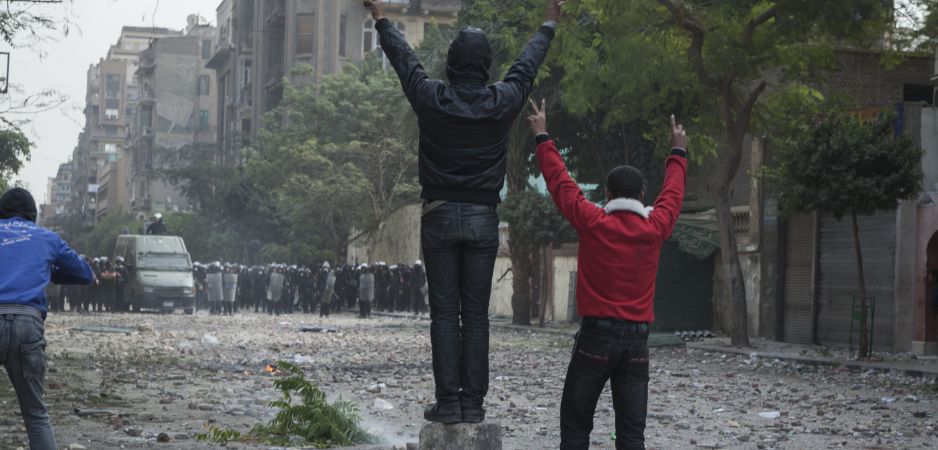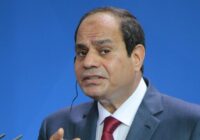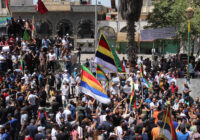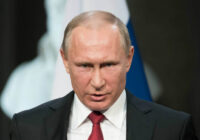Sports may, for now, prove to be a way for President Sisi to engage with Egyptian youth.
An Egyptian businessman with close ties to Abdel Fattah al-Sisi, the general-turned-president, has submitted a bid for the broadcasting rights of the Confederation of African Football (CAF). The move is widely seen as an effort to polish the image of Egypt, which has been tarnished by the mass abuse of human rights, failing economic policies and a military coup in 2013 that put an end to the country’s first democratic experiment.
The $600 million bid also challenges the predominance among Arab satellite broadcasters such as beIN, the Qatar-owned sports network that is part of Al Jazeera and has bought broadcasting rights across the globe.
If successful, the bid could help improve Sisi’s domestic standing at a time when the president is struggling economically and being propped up by funding from Saudi Arabia and the United Arab Emirates. Many Egyptians cannot afford beIN’s subscription rates that range from $7.50 to $54 a month.
Relations between Qatar, a supporter of the Muslim Brotherhood, and Egypt have been strained ever since Sisi toppled Mohammed Morsi, a Brotherhood member and Egypt’s first and only democratically elected president.
In June, Morsi was sentenced to 25 years in prison for passing state secrets to Qatar, in a case in which several Al Jazeera journalists were convicted in absentia to either death of long prison terms. Al Jazeera was taken off the air in Egypt within hours of the 2013 coup, and three of its journalists were held in prison and sentenced to years in jail before ultimately being released.
Ahmed Abou Hashima
The businessman, Ahmed Abou Hashima, a steel and media magnate with close ties to President Sisi, has the support of members of parliament close to the Egyptian leader despite Arab media reports that the Muslim Brotherhood supported him in 2012 when Morsi was in office. Abou Hashima sought help at the time in his high-profile divorce—reportedly involving a $30 million settlement—from Haifa Wehbe, one of the Arab world’s most prominent singers and actresses.
Abou Hashima’s effort to improve Egypt’s international image by buying African broadcasting rights builds on Egypt’s past African soccer glory. Egypt’s national team is the African Cup of Nation’s most crowned squad, winning the title in the three consecutive tournaments that preceded the 2011 popular revolt which overthrew President Hosni Mubarak.
“We do our best to project Egypt’s name in all sectors in Africa, especially sport,” Abou Hashima said in a Facebook post on August 30.
Pro-Sisi deputies have linked Abou Hashima’s bid more directly to the mass anti-Morsi protests in summer 2013 that were supported by the military and security forces and paved the way for Sisi’s takeover.
“The proposal the Egyptian company presented to buy the broadcasting rights of African football honors the Egyptian people after the 30 June glorious revolution,” Hamdy al-Sisi, a namesake of the president, lawmaker and member of the lower house’s Youth and Sports Committee, told Al-Monitor.
“Egypt is the main key driver of the Middle East and it remains the pulse of the Arab world. The fact that an Egyptian company obtains the broadcasting rights of matches indicates a lot, including Egypt’s recovery from its crisis as it has come back to the African arena,” added Mahmoud al-Sayyed, another lawmaker and committee member.
Proper marketing of the broadcasting rights would project Egypt—despite a violent insurgency in the Sinai—as stable, demonstrate public support for Sisi and boost tourism, according to Sayyed.
Abou Hashima’s bid appears also to be part of broader government strategy to harness soccer in its effort to garner domestic popularity. The bid was announced days after Sisi ordered a feasibility study for the construction of a new stadium in the Suez Canal city of Port Said, one of Egypt’s least populated and most neglected governorates.
Egyptian Ultras
Seventy two members of Ultras Ahlawy—a militant soccer support group that played a key role in the overthrow of Mubarak and subsequent resistance to military rule—died in Port Said’s existing stadium in 2012 in a controversial and politically loaded brawl. It was Egypt’s worst ever sporting incident. Port Said did not figure in the government’s investment plan that was presented in 2015 to an economic development conference.
Many in Port Said resent the fact that court proceedings have laid blame for the incident with militant supporters of Al Masri SC, some of whom have been sentenced to death, and two security officials in the city. Seven other security officers were acquitted. The defendants have appealed the verdicts.
 Fair Observer provides you deep and diverse insights for free. Remember that we still have to pay for servers, website maintenance and much more. So, donate now to keep us free, fair and independent.
Fair Observer provides you deep and diverse insights for free. Remember that we still have to pay for servers, website maintenance and much more. So, donate now to keep us free, fair and independent.
Sisi sought to co-opt Ultras Ahlawy earlier this year on the fourth anniversary of the tragedy by offering group the chance to independently investigate what happened. Ultras Ahlawy turned the offer down, arguing that it could not simultaneously act as accuser and judge.
The Egyptian president made his offer as militant soccer fans formed the backbone of anti-government student protests that were brutally squashed. The protests were not only against the harsh repression of the Sisi regime, but also against its economic and social policies that have failed to create public sector jobs for graduates and more places for students at universities.
Sisi’s effort to use sports to his advantage sought to exploit the fact that physical exercise, including jogging and cycling, enjoys unprecedented popularity among Egyptian youth. In one event, the president led military academy cadets in 2014 on a well-publicized bicycle ride around Cairo, the Egyptian capital.
“The young people can’t go out demonstrating, but they can go out to run,” sports coach Ramy A. Saleh told The New York Times. “It’s connected with the withdrawal from public life by young people,” added political scientist Ezzedine C. Fishere.
“Everyone who had participated in 2011 [in the popular revolt] started to move to the private sphere, some took refuge in depression, some in nihilistic activities and many in fitness — not just fitness, but taking care of oneself,” Fishere said.
Sports may, for now, prove to be a way for President Sisi to engage with youth who, in the absence of post-2011 politics, find expression in physical activity. If history is any guide, however, sports could also turn on him as was evident with soccer fans being the foremost group to physically resist the Mubarak regime in the years before the former president’s downfall.
Sisi appears to recognize this with Egyptian stadiums remaining largely closed to the public since 2011. But that didn’t stop Ultras Ahlawy from rioting in July during a match against a Moroccan team.
The views expressed in this article are the author’s own and do not necessarily reflect Fair Observer’s editorial policy.
Photo Credit: Karim Mostafa
Support Fair Observer
We rely on your support for our independence, diversity and quality.
For more than 10 years, Fair Observer has been free, fair and independent. No billionaire owns us, no advertisers control us. We are a reader-supported nonprofit. Unlike many other publications, we keep our content free for readers regardless of where they live or whether they can afford to pay. We have no paywalls and no ads.
In the post-truth era of fake news, echo chambers and filter bubbles, we publish a plurality of perspectives from around the world. Anyone can publish with us, but everyone goes through a rigorous editorial process. So, you get fact-checked, well-reasoned content instead of noise.
We publish 2,500+ voices from 90+ countries. We also conduct education and training programs
on subjects ranging from digital media and journalism to writing and critical thinking. This
doesn’t come cheap. Servers, editors, trainers and web developers cost
money.
Please consider supporting us on a regular basis as a recurring donor or a
sustaining member.
Will you support FO’s journalism?
We rely on your support for our independence, diversity and quality.






